This post is sponsored by Quran Moon Lamp. Use "AYEINA15" code for 15% discount.
Do you read articles upon articles and feel frustrated by the end of the day because you still don’t exactly know what to do? In this blog post, I have added practical examples from my own life to help you see how you can try your own version of something like this too. My examples are not perfect – they are just real stories to help you relate perhaps. You don’t have to do things exactly like me because I’m an imperfect human being with imperfect little children, which is why I have added verses and ahadith in almost all the points to help you in a perfect way! I pray that you and your kids benefit immensely from this! I get many questions on “how to teach kids Quran and ahadith” and I always reply that it WILL come naturally when they love it, so focus on helping them fall in love with the Quran and sunnah first instead of focusing on teaching. When the base is strong, whatever you build above it will stand strong too in shaa Allah. So, the first step is the hardest – but probably the most effective one!
1) Become a walking Quran yourself – who loves to emulate the sunnah in his/her life
Every time I tell my daughter a hadith that I’m not acting upon, I feel so hypocritical. How can I influence someone into doing something I’m not even doing myself. I reduce the influence of my words greatly. If the power of Allah and His Messenger ﷺ’s words could not enter the heart of a preacher, how will they enter the heart of a listener? So when you raise the deen standards for your kids, make sure you raise them for yourself as well.
Practical example:
For example, I teach my daughter about kindness all the time, but in the heat of the moment I may forget it myself. I only realise how these instances are the greatest teaching moments, when I actually act like a conscious parent amidst turmoil! If I add to the chaos that’s already there, it’s just a messy tornado we’re all in. I remember when my rather-obedient 4 yr old suddenly turned into a total rebel. I just stared in disbelief as she cried so loudly (like screaming-crying) on something so little. And then it hit me. The previous 2 weeks (before that incident) went by with her little sister getting the constant attention because of the broken arm and she was getting sidelined completely. And I didn’t even realise it until the results were pouring out right in front of me. So instead of saying – stop crying, I let her cry. After few hours went by and my 1yr old finally laid down for a nap, I went to do some drawing with my 4 yr old. We just quietly drew together. No questions asked. Just some silent one on one time. She coloured JANNAH JOURNAL (This belongs to – page) while I added in my colours as well.
Then after maghrib, I joked with her, “so where did my daughter go? I could only see shaitaan at that time” she giggled and recited “aoodhubillah”. I put my ear to her chest and said: “is he out yet?” She laughed and said: “no”. I said: “perhaps we’ll have to tickle him out then.” I tickled her till she rolled on the bed and said: “he’s out, he’s out” and then we simply hugged…
The times when I do the same things I ask my daughter not to do, it doesn’t end nicely. It usually means a child shuts up out of fear and then shuts down or shuts you out. And eventually kids stop taking us seriously when we keep saying what we don’t even mean over and over…
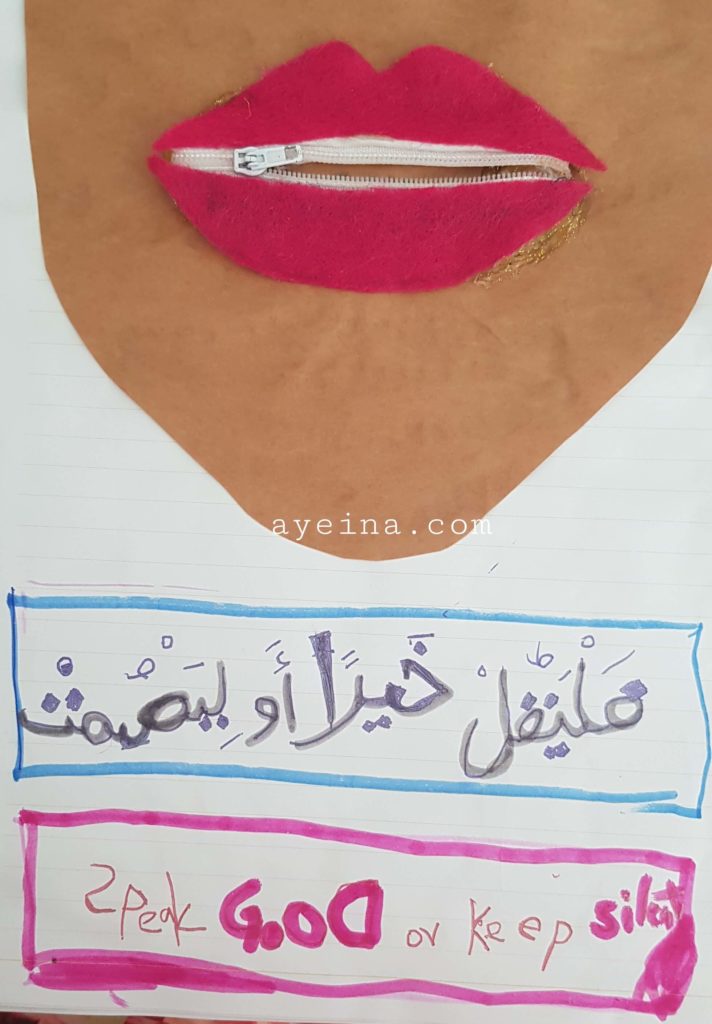
2) Let them start their day by listening to the Quran
You can start even before your children are born; while you’re still pregnant. You can recite the Quran in a loud voice or your husband can, while you listen to his recitation. When taking care of the house, cooking, or simply relaxing, play the recitation of the Quran as much as you can. Allow the Quran to soothe the babies when they feel anxious or when they cry.
Messenger of Allah ﷺ asked ‘Abdullah b. Mas’ud to recite to him (the Qur’an). He said: “Should I recite it to you while it has been sent down or revealed to you?” He (the Holy Prophet) said: “I love to hear it from someone else.” So he (‘Abdullah b. Mas’ud) recited to him (from the beginning of Surat al Nisa’ up to the verse:” How shall then it be when We bring from every people a witness and bring you as a witness against them?” He (the Holy Prophet) wept (on listening to it)…” [Hadith: Muslim 800 c]
Practical example:
My aim with my children is usually helping them finish listening to the whole Quran before the age of 2. Of course, that can happen earlier too, but since I try to turn the recitation off when everyone is talking, it’s a slightly slower process. With the first child it was easier – add in more and the process gets a bit complicated, but alhamdulillah as long as they get familiar with the words of Allah, a timeline is not set in stone – Whatever suits your family routine. And you will see your kids memorizing some of the verses just by listening (especially if they are aural learners). My 4yr old is not really an aural learner yet learnt some of the verses that she loves (I’m not sure why she chose to learn the verses – [83:7], [2:9], [3:200]) – they make her happy and I can see it in her smile when they are played on Quran Moon Lamp).
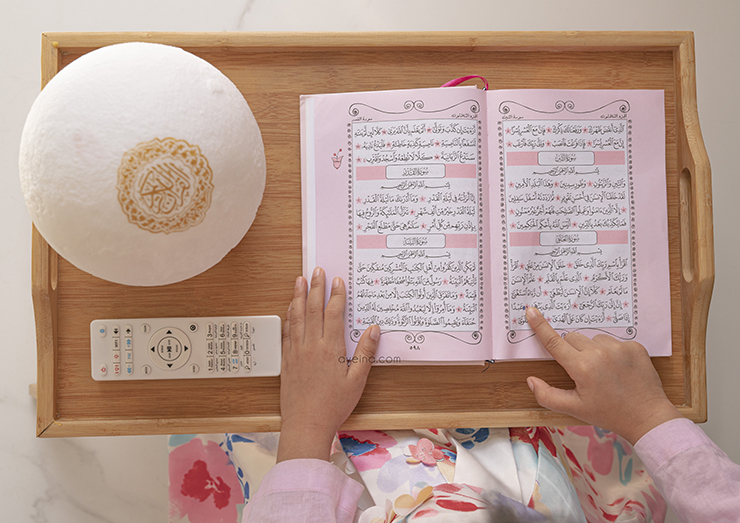
3) Nurture their love for Allah and His Messenger ﷺ
We have already talked about helping children love Allah and Islam (click HERE), but in this blog post, I want to focus on the sunnah. Loving the Messenger who brought this beautiful religion to us is a natural process of loving and living Islam. Instilling love of Rasool Allah ﷺ is probably a topic that needs an entire blog post of its own, but reading about his life (seerah) will help the kids fall in love with him (and even YOU will strengthen your love for him by getting to know him better).
The Prophet ﷺ said “None of you will have faith till he loves me more than his father, his children and all mankind.” [Hadith: Bukhari 15]
Practical example:
My 4yr old usually asks me (while doing something) if Muhammad ﷺ did the same? She was once feeding her little sister yogurt and asked me: Ama, Did Muhammad ﷺ eat yogurt? (because she LOVES yogurt and perhaps wanted to know if Muhammad ﷺ liked it too). I remember the time when my then-3yr-old was memorizing Surah Nasr, I discussed a bit of tafsir too (in very simple words that she could understand). When she got to know that this was the last surah to be revealed and Muhammad ﷺ passed away after that, she asked me while sobbing: “Ama, why did Allah ta’ala take the rooh (soul) of Muhammad ﷺ away? How will I talk to him now?” Even though I have still not introduced hell fire and grave punishment etc. to my now 4yr old, death was not a strange concept to her even when she was 3 because we have seen many deaths of our loved ones – kids have also seen dead birds, insects etc. many times – so I simply replied – “but we CAN talk to him in Jannah in shaa Allah, so we have to strive harder and do things the way he did so we can be his neighbour in Jannah in shaa Allah”.
4) Make Quran and Hadith interactive through gestures and signs
Since small kids don’t communicate much through words, many speech specialists recommend using sign language to make the process of communication as tantrum-free as possible – the more the child expresses, the better emotional flow they have. There are so many ahadith where Muhammad ﷺ used gestures and signs to explain to the sahaabah (who were adults – who could hear everything he had to say – yet he used signs to enforce the learning even better).
The Prophet ﷺ said, “A faithful believer to a faithful believer is like the bricks of a wall, enforcing each other.” While (saying that) the Prophet ﷺ clasped his hands, by interlacing his fingers.” [Bukhari 481]
Below, you’ll find another famous hadith that tells us how he ﷺ explained the companions with the help of signs (to make it more interactive too):
The Prophet ﷺ said, “I and the person who looks after an orphan and provides for him, will be in Paradise like this,” putting his index and middle fingers together. [Bukhari 6005]
Practical example:
Apart from telling these ahadith with signs, I do the following with my 1yr old (soon to be 2yr old) – I ask her (based on THIS hadith): Man rabbuk? (Who is your Lord?). She points up and says: “Allaaaa” (Allah) – based on this hadith. I ask: Maa deenuk? (What’s your religion?). She joins her hands like dua (according to Islamic BSL – British Sign Language for the word Muslim (because the sign for the word “Islam” is a bit hard for her age)) and says: “Illlaaaam” (Islam) – sometimes she just uses the sign language. I ask: Man rasool/nabiyyuk? (Who is your messenger?). She puts her hands on her heart and says “Moomad” (Muhammad). Nowadays 4yr old asks her these questions – especially when she got to know that Allah has promised a reward for the one who teaches someone something good, so she says that she wants more “jannah points” (rewards).
With my 4yr old, if we are memorizing a surah or hadith (in Arabic), I aid it with gestures. For eg: when she was memorizing Surah Qadr (chapter 97 in the Quran), we did a laylatul Qadr sign whenever the word came (thrice) and then angels sign (whenever the word “malaika” came) – all learnt from A-Z of Islamic Signs in BSL Book. This way she not only understood the Arabic, but because of the signs, she also built a visual memory of what’s next (without stepping the Islamic boundaries of illustrating the unseen etc.).
In terms of ahadith, she memorised part of THIS one: …. الْمُسْلِمُ أَخُو الْمُسْلِمِ، لاَ يَظْلِمُهُ وَلاَ يُسْلِمُهُ
She does a “Muslim” sign and then joins the forefingers of her hands together and move them while saying “Muslim akhul muslim” (A Muslim is a brother of another Muslim), then she sways her finger sideways to gesture “no” when the next part of the hadith comes – “… so he should not oppress him, nor should he hand him over to an oppressor…” – 1yr old copies her as well and signs the same things as her elder sis while saying ” laa laa laa”. The other day she heard a word “Muslim” and started shoving her moving fingers in my face because she wanted to hear the hadith. When I didn’t see her fingers, I didn’t know what she wanted from me and why she was whining. But gestures helped her convey what she needed at that time alhamdulillah.
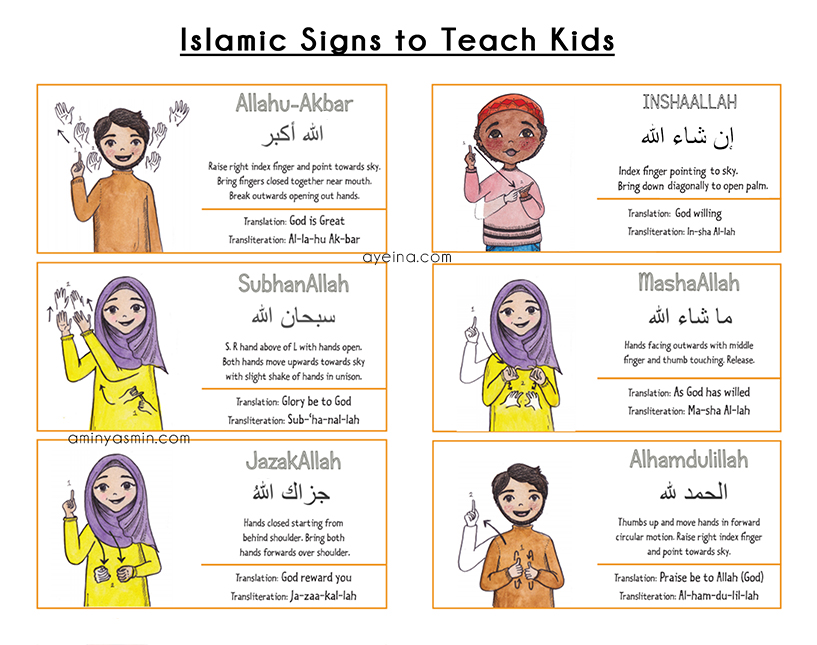
5) Teach them how to reflect through Quran & Hadith Journaling
They know HOW to think, so you don’t have to tell them WHAT to think! Ask calibrated questions to help them think and avoid making them too busy to even reflect. When their timetable is over-scheduled and they are always rushing from one activity to another, they may lose the ability to ponder – while Allah says that a believer is a person of reflection. Personally, our lives are quite slow (since we homeschool) and it gives us plenty of time to have deeper conversations.
It was narrated from ‘Abdullah bin Mas’ud that the Prophet ﷺ drew a square, and a line in the middle of the square, and lines to the side of the line in the middle of the square, and a line outside the square, and he said: “Do you know what this is?” They said: “Allah and His Messenger know best.” He said: “Man is the line in the middle, and these lines to his side are the sicknesses and problems that assail him from all places. If one misses him, another will befall him. The square is his life span, at his neck; and the line outside it is (his) hope.” [Ibn Majah 4231]
It is a natural tendency for learners to learn through seeing and interacting. Usage of infographics in learning can increase learners’ visual literacy and helps in increasing teaching effectiveness.
Note: While journaling, you can tell the kids not to illustrate anything unseen (Allah, Prophets, Angels, Hell, Paradise, Satan, Jinn etc.) and tell them about the prohibition of picture making in general. Perhaps introduce them to the beauty of Islamic geometry and design (that was the same reason why Islamic geometry came into being. Muslim artists did not want to decorate their places of worship (mosques) like people of other religion did and to avoid picture-making, they turned to florals, geometry etc.)
Practical example:
Recently, I have started hadith journaling with my 4yr old because she can’t stop asking me to narrate her a hadith every night. I hadith journal myself (only weekly), so that helped me before, BUT since she asks every single night now, I’m out of ahadith! Hence we have started 40 Hadith an Nawawi with Quran Moon Lamp – which is in a very beautiful recitation format. We hope to cover one hadith a day.
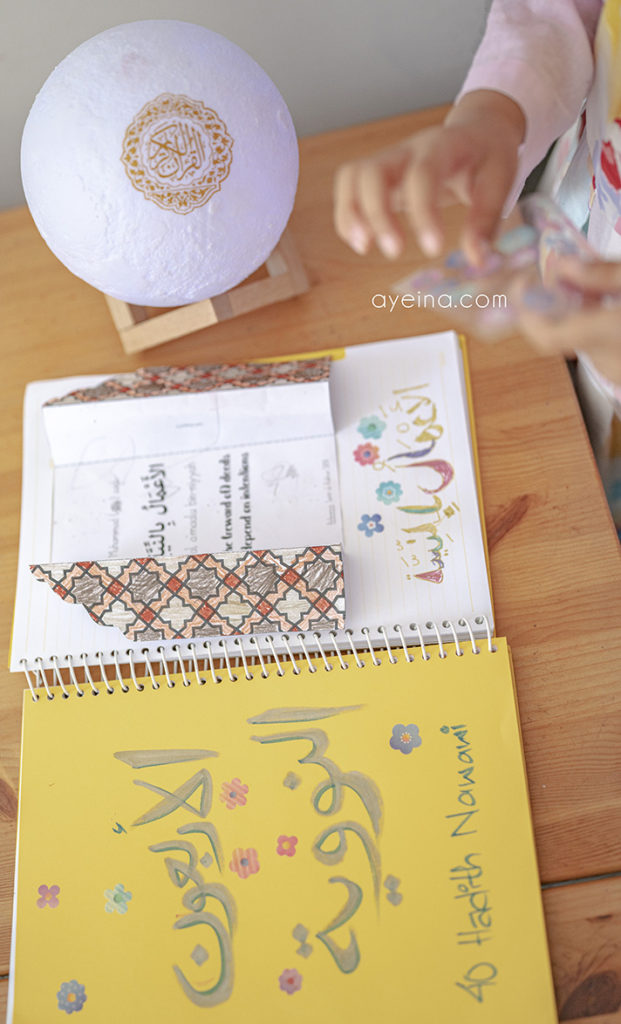
6) Help them understand instead of only focusing on memorization
Don’t limit the recitations to Juz ‘Amma only (also, because most of the chapters in the last part of the Quran are about hell fire and punishment, which can be introduced AFTER your child has developed the love for Allah). I know most people focus on memorizing 30th juz because it’s probably the easiest (I’ve done so myself), but I’m helping my kids memorize ONLY those chapters that are not punishment-related because we do tafseer with the memorization. I talked more about it HERE.
Messenger of Allah ﷺ said: “For whomever Allah wants good, he gives him understanding in the religion.” [Hadith: Tirmidhi 2645]
Practical example:
Once my 4yr old was crying while asking why didn’t she get the “Pakistani” eyes and why are her eyes “Chinese” (my husband is from a mixed race family – his mother is half Chinese and half Spanish with Filipino blood as well hence she looks more East Asian/Southeast Asian than South Asian). So I told her this hadith: “Verily Allah does not look to your faces and your wealth but He looks to your heart and to your deeds.” [Muslim 2564 c] – Then I said: “Allah has made everyone beautiful and unique. If everyone looked the same, it would have been so hard for me to find you in the crowd – you are beautiful the way Allah made you. But yes, you CAN make yourself more beautiful”. I put her in my lap and wrapped my hands around her heart – “You can beautify THIS, your words and your actions” then I reminded her of the hadith she was memorizing at that point by pointing my finger to her heart – taqwa is here – التَّقْوَى هَاهُنَا (at taqwa haa huna).
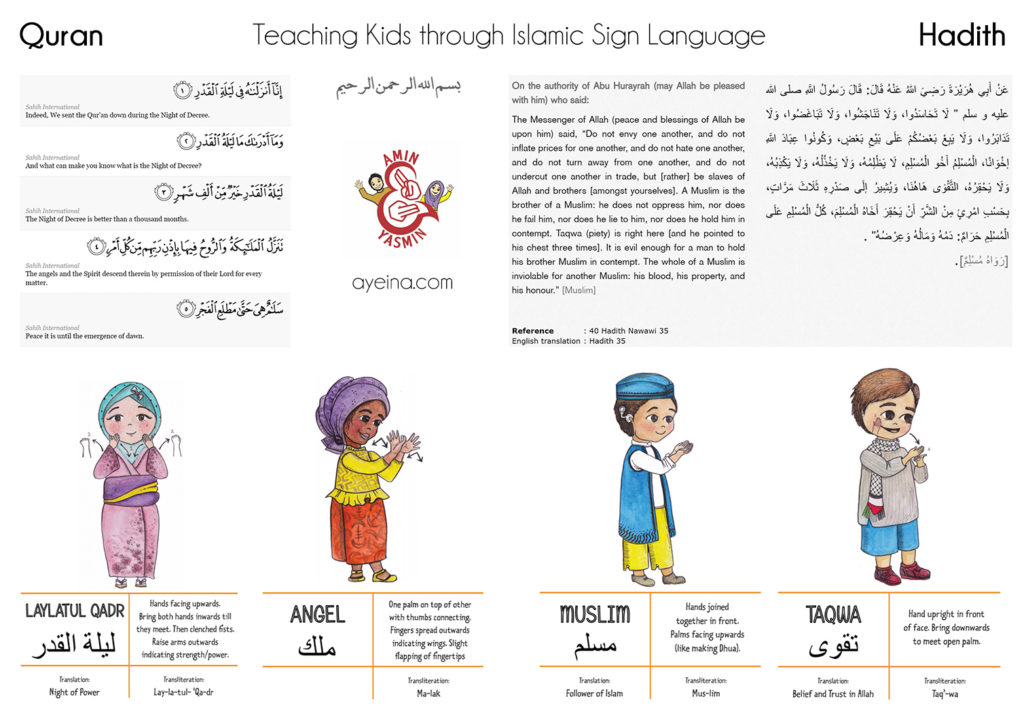
7) Talk to them in the language of Quran and hadith so they can see its practical application in their life
Personally, my kids have learnt those lessons the best which were practical and timely – when I told them a hadith or a verse according to the ongoing situation. For that, I have to be mindful myself – which is hard when you are juggling a lot of things as a mother – so I’d really recommend having some free time in your day where you can reflect and just be! For eg: as soon as the kids get up, instead of making a breakfast for them right away, give them warm honey water (sunnah) and a banana or dates – so you’re not stuck in the kitchen and you can sit with them to ask them about the dreams they saw (like companions used to narrate their dreams to Muhammad ﷺ – but you don’t have to interpret them of course – it’s just a way to get the conversation going and if you hear a good dream, you can tell them that a good dream is from Allah). You can then sit for some Quran/hadith time and then shift to proper breakfast if you see them getting distracted a lot. It will give you and them – both a break before you’re ready to resume.
Practical example (Quran):
The verse “fasbir sabran jameela” [Quran 70:5] is probably the most used verse from Surat Al-Ma`ārij in our house (you know how much you need it with small kids). Whenever my kids are asking me gazillion things to do at one time, I tell them that as a human being, I can only do one task at a time with ihsan. Only Allah can do multiple things at one time perfectly. It’s just a matter of “KUN FAYAKOON” (Be and it is) for Him [Quran 2:117]. Then I say if you can help me finish this task, then teamwork will help us achieve that faster. But if you can’t, then “fasbir sabran jameela”! (Arabic is not our first language, but we do try to incorporate it with Urdu or English every now and then). As soon as my 1yr old hears this, she joins her fingers together and moves it (see these story highlights to know what I’m talking about).
Practical example (hadith):
I can’t forget the time when my then-3yr-old looked up at the sky and jumped with joy while shouting “THIS IS HOW WE WILL SEE ALLAH TAALA IN JANNAH” while pointing at the full moon. I simply told her THIS hadith from the Jannah journal and she innocently applied it in her life when she saw the beauty of a full moon…
So instead of applying the hadith or verses of the Quran in their lives yourself, perhaps sometimes let them think in the language of Quran and Sunnah too.

8) Let them sit in the company of wise adults and ask questions to help them ponder
Organize Quran and Islamic story circles. If there isn’t an existing group around you, make one with some friends! Perhaps start a Whatsapp group to organise them each week. You can do this online as well.
Narrated `Abdullah bin `Umar: Once Allah’s Messenger ﷺ said, “Amongst the trees there is a tree, the leaves of which do not fall and is like a Muslim, tell me the name of that tree.” Everybody started thinking about the trees of the desert areas and I thought of the date-palm tree but (I looked behind to see that I was the tenth and youngest of ten men present there, so I kept quiet) felt shy (to answer). The others asked, “O Allah’s Apostle! inform us of it.” He replied, “it is the date-palm tree.” I told my father (Umar) what had come to my mind and on that he said, “Had you said it, I would have preferred it to such and such a thing that I might possess.” [Bukhari 131]
I loved how Prophet Muhammad ﷺ turned a daily life scenario (when he was brought the fresh dates) into an opportunity of learning and asked questions to develop curiosity among them. By allowing the learners to be curious, especially the kids, we recognize their minds to be active instead of passive and observant of new ideas. Curiosity is an ingredient in the development of well-being and meaning in life. Also, I loved how Umar رضي الله عنه brought his young son to sit among all these educated men well beyond his age. Usually with school system dividing kids into the same age groups, we sometimes forget how learning within different age groups can really expand the horizon of your mind. So don’t limit your child’s exposure to the kids his/her age/race/culture/language only. Let them learn from a diverse set of people. Let them sit among the adults (if they are having intellectual conversations) instead of sending them away to play so they don’t cause any disturbance. Welcome kids in your circles! I think this hadith is a beautiful practical example on its own.
9) End the day with the words of Allah and His Messenger ﷺ
We have the longest bedtime routine most days because I feel like that’s the time when kids REALLY open up. First, we read some book (nowadays we are reading “A-Z Islamic sign language” (use the code “AYEINA10” for 10% discount) – I turn on my mobile torch and we get to see our shadow-sign like that. It’s a fun way to keep those signs in their memory. We mostly giggle at how 1yr old makes her signs (especially her “angels” sign)). Then we have our Jannah discussions – where I tell my 4yr old a hadith/verse about Jannah from the Jannah Journal (to end our day on a positive note – which makes a huge impact on how they start their next day). And then she asks me if I read any hadith today and I usually just repeat the one we did in the morning through Quran Moon Lamp or I play another one on the speaker. Then she asks me to turn the Quran recitation on after she’s done with her sleeping sunan (adhkaar etc. – you can find a full list HERE (we do just the basics)).
Practical example:
One day my 4yr old woke up in the morning and said: “I miss Allah ta’ala”. I asked her why and she replied: “because you turned on the Quran recitation when we were sleeping”. That was the day, when I realized how important it was to end their day with the words of Allah.

10) Stay patient, praise effort and forget perfection
Let your relationship with your kids be collaborative where the children’s ideas and wishes are considered as well. Show confidence in your children’s capabilities – Ability to choose for themselves. Ability to do their own tasks etc. Teach them that they have control over their lives. This not only teaches better self control and independence, but also takes them out of the puppet phase so they can make their own decisions without your involvement – which helps them become more responsible because they learn to own their decisions and mistakes as a result. They gain better problem solving skills due to more experience in making mistakes and learning through them. Provide guidance and then give them the freedom to make their own decisions because intrinsic motivation is a huge step in their self development journey. When they are allowed to consider various options, they eventually become good decision makers and hence more confident kids with better self esteem. Forcing young children (under 10) to perform acts of worship by compelling them or being too strict may lead to them disliking the religion and fleeing from performing acts of worship. This method can nurture hypocrisy in children. Making children love the religion is an art and skill many of us don’t consider important enough to learn.
Anas said: the Messenger of Allah ﷺ was one of the best of men in character. One day he sent me to do something, and I said: I swore by Allah that I would not go. But in my heart I felt that I should go to do what the Prophet of Allah ﷺ had commanded me; so I went out and came upon some boys who were playing in the street. All of a sudden the Messenger of Allah ﷺ who had come up behind caught me by the back of the neck, and when I looked at him, he was laughing. He said: Go where I ordered you, little Anas. I replied: Yes, I am going, Apostle of Allah! Anas said: I swear by Allah, I served him for seven or nine years, and he never said to me about a thing which I had done: Why did you do such and such? Nor about a thing which I left: why did not do such and such? [Hadith: Abi Dawud 4773]
Practical example:
My 4yr old was once crying while saying: “I want to draw full portraits” (she’s a HUGE art enthusiast). I said to her: “it’s your choice” (because I had already discussed THIS hadith with her – I didn’t tell her about the punishment, I simply said that we won’t be able to infuse rooh (soul) in our portraits, so we don’t start what we can’t follow through). She said: “I want you to teach me” (while still crying). I replied: “I’m not forcing you, but I can’t help you in it because we only help each other in good deeds”. Then I gave her the space she wanted to cry some more. After that, I saw her drawing and I asked: “so why didn’t you draw a full portrait? I didn’t stop you!” She said: “because I don’t want to anymore…” Sometimes following Allah’s commandments isn’t easy. And it’s good to not force our kids because they already have the desire to follow Allah’s commandments naturally. Let them learn self-control through experiences like these – you don’t have to stop them each time with a threat or so.
When things settled down, I asked her: “if your best friend was stealing, would you help her?” She said: NO. Then I asked: “if I was hitting someone unjustly, would you help me?” She said: NO. I said: Yes, and you shouldn’t because that’s what true love is! We help each other to make each other better people. We don’t help each other in doing wrong things because we want pleasure of Allah and Jannah for our loved ones as much as we want it for ourselves.
Would you like to add more points to this blog post? Share your practical examples below in the comments section because it really helps people relate on a personal level. May Allah make it sadaqah jaariyah for you! And if you purchase any of the mentioned products, use the code “AYEINA10” for 10% discount.




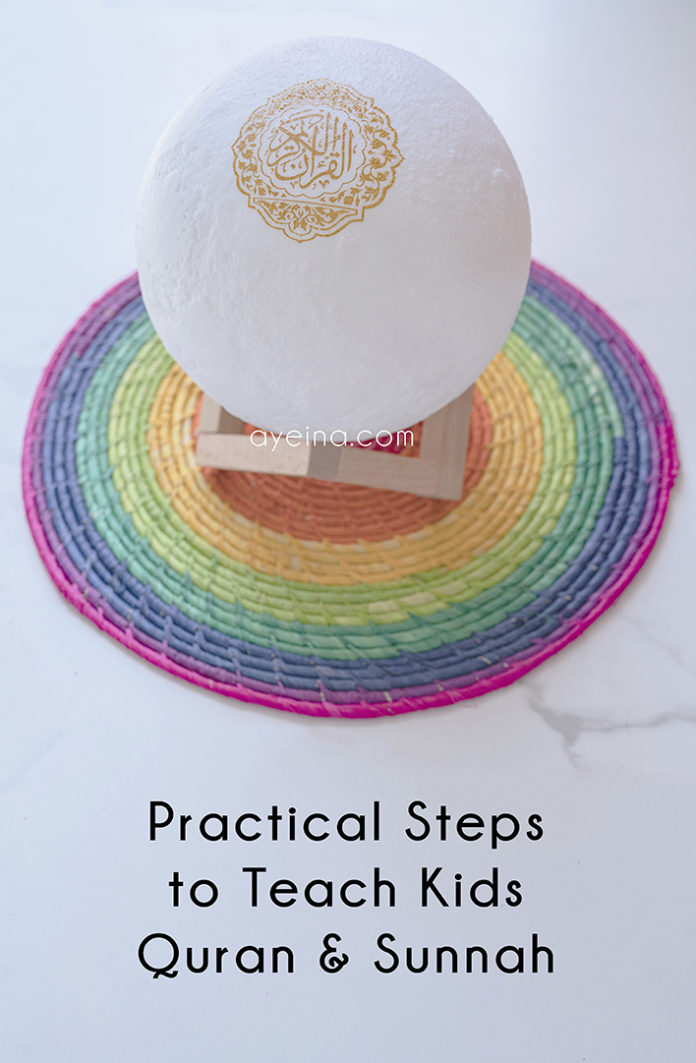
That lamp looks lovely masha’Allah
JazakAllah Khaor for sharing these tips…this is so true: Become a walking Quran yourself
Been thinking to get my youngest into Quran journaling but never really know where to start
They can simply start with copy work to practice their Arabic writing etc. Or they can just write the translation. However you think it can stick to their mind in shaa Allah.
Couldn’t Stop Reading Ma’sha Allah.. May Allah bless our little ones.. May they grow up in the path of truth.. Jazak Allah khayran.
Aameen thumma aameen. May Allah guide us all and keep us all on the straight path!
I love this article! Masha Allah it is so beneficial and offers much practical application for parents. The Quran Moon is beautiful. I’ve never seen it before! I’m definitely going to look into for my daughter. Where did you purchase your Qur’an from? Jazakallahu khair for giving me so many ideas as a parent.
jazakillah khairan katheera for your kind words. Yes, the Quran Moon Lamp is indeed beautiful. We’ve been using it for Qaida (that teaches how to read the Quran) revision as well. And do you mean the pink Quran? It’s from @quranforlittlehearts on Instagram 🙂
The best way to teach children is by doing just the things yourself first for sure! Such a valuable opportunity to learn and better yourself!